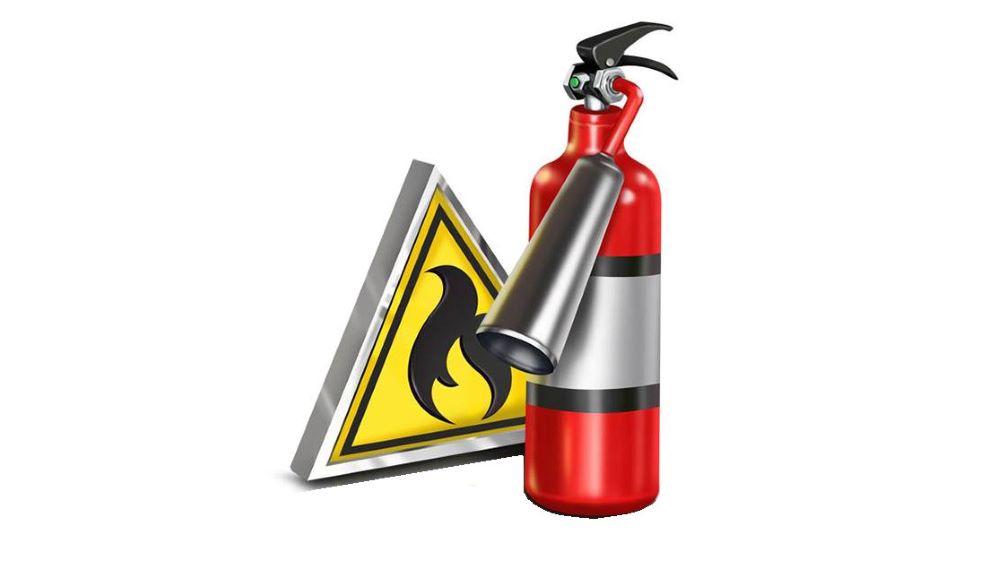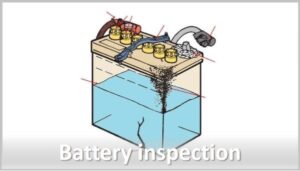Fire protection
There is always a fire risk in the service workshop, so we take precautions to ensure adequate fire protection. Handle flammable liquids and gases with care. Avoid open flames and causing sparks in their vicinity.
There is fuel in the vehicles. Fuel is spilt during the filter replacement, supply components, pumps or tanks. Hose removal should follow the manufacturer’s procedure for depressurizing the system. Pressurized hoses cause fuel to splash and spill. Liquid fuel evaporates quickly, especially when spilled. Fuel vapours are three to four times heavier than air, spread quickly to fill any low spots such as service pits, and are extremely easy to ignite. Thus, the ignition source may be quite far from the spill site. Any spark, open flame or cigarette can ignite fuel vapours.
If you smell fuel, stop work and look for the source of the leak. It only takes a small amount of fuel mixed with air to cause ignition. Do not ignore the presence of fuel vapours. Open the door and turn on the ventilation to air out the workshop. Make sure to wipe up spilt fuel immediately. Take the soaked rags and towels outdoors as the fuel continues to evaporate from them, and then store them in the prescribed hazardous waste containers. Also, take the replaced filters and fuel supply elements out of the workshop into the open because they contain fuel that evaporates.
When it is necessary to drain the fuel, do so in a well-ventilated area or outside. Store drain fuel in fuel containers. Never weld near the fuel tank or hose. An empty tank may contain fuel vapours that are more dangerous than a full tank of liquid fuel. Do not attempt to repair or weld the tank yourself, that is a job for specialists.
Never use fuel to clean hands or tools.
Alternative fuels such as ethanol or gas spread rapidly and are highly flammable. Handle ethanol or gas-powered systems with care.
Cleaning solvents are not as volatile as fuel, but they are flammable. They should be treated and stored in the same way as fuel. Adequate ventilation is necessary in areas where solvents are used and stored.
Greasy rags can also be a source of fire. Such clothes should be stored in an approved container and not disposed of with ordinary trash. Oily, greasy or paint-soaked rags that are not stored properly can cause spontaneous combustion, i.e. self-ignition.
All types of batteries are potentially dangerous, as damage or a short circuit can cause an explosion and fire. Batteries must be disposed of in a prescribed manner in separate rooms.
Store oils and flammable liquids in the original or prescribed canisters. They are put away and stored in a room intended for their storage.
Fire prevention is the best action you can take. When a fire breaks out in a workshop, the fire can quickly spread out of control. If a fire breaks out, respond and act accordingly. You have to assess the situation quickly and react in time. It is necessary to know the procedure after a fire, where firefighting equipment is stored and how to use it. When there is a fire in electrical installations and appliances, turn off the power at the main switch in the electrical panel.
Three elements must be present at the same time for a fire to occur: fuel, oxygen, and heat. Extinguishing a fire involves removing at least one of these elements. When a fire breaks out, oxygen or heat is usually removed. For example, a fire extinguisher removes oxygen and water removes heat from a fire.
Always sound the alarm before attempting to extinguish a fire. The fire extinguisher is used to extinguish small fires in the workshop. Never hesitate to call the fire department if you cannot extinguish a fire quickly and safely.







